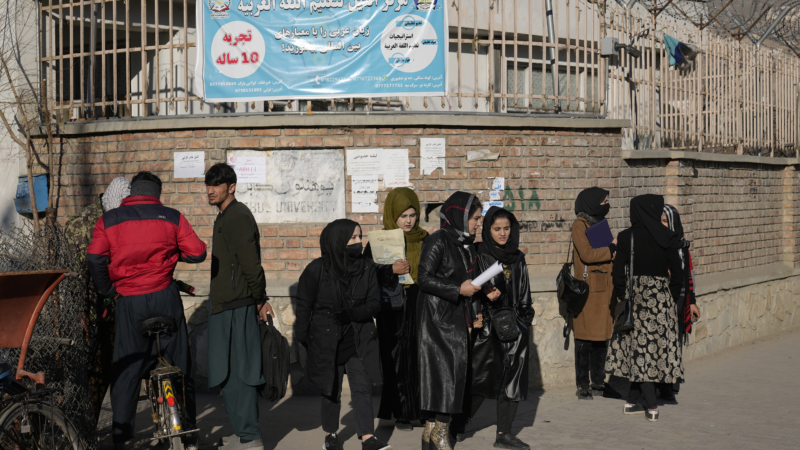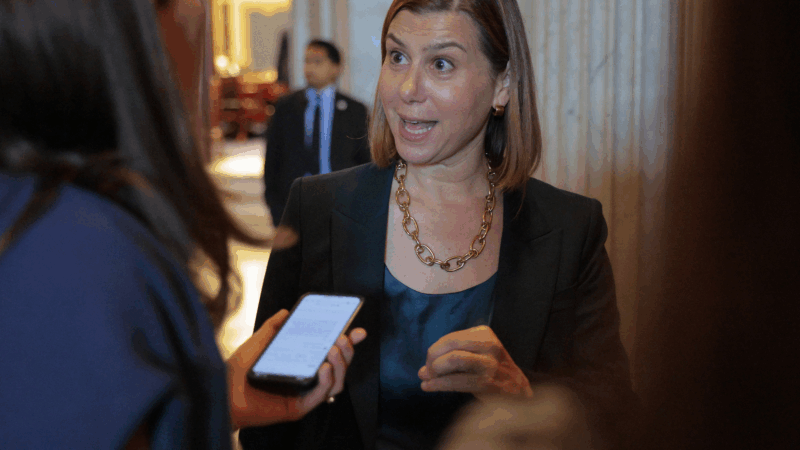USAID enabled 208 Afghan women to defy the Taliban ban on college — until now
She’s a young woman who has zero chance of pursuing a college degree in Afghanistan.
That’s because in December 2022 the Taliban decreed that women would no longer be allowed to pursue university education. High schools for girls were banned the year before.
But she found a way to follow her dream. Starting in 2024, R.K. began taking online courses at the American University of Afghanistan (AUAF), thanks to a scholarship funded by the U.S. Agency for International Development (USAID). (R.K. asked to be identified by her initials because of fear that the Taliban would threaten her for defying their ban.)
Now R.K. and 207 other young women with scholarships are in limbo because of a series of communications from USAID, first stating that the program would operate through June but with no further details beyond that date — and now with an April 5 email stating that the program would be terminated immediately “pursuant to a review and determination that the award is inconsistent with the Administration’s priorities.” This directive was one of many terminated notes sent on that date from Jeremy Lewin, deputy administrator at the significantly shrunk USAID.
How the USAID endowment worked
The scholarship itself has an unusual history. In 2018, USAID gave a $50 million bequest to the Texas A&M University Foundation to create and administer the Women’s Scholarship Endowment program (WSE). “We are an endowment — the first endowment that USAID awarded in nearly 40 years,” an official with the scholarship program tells NPR. The official asked for anonymity because they are not authorized to talk to the media.
“So it’s in an investment pool, and the program itself runs only on the interest generated from that $50 million, which remains intact. We haven’t even touched it,” the official says.
The interest pays for 208 scholarships, including R.K.’s. Along with dozens of students, R.K. participates in online learning from their homes in Afghanistan. (Additional USAID funding pays the teachers and other expenses.)
AUAF is a Kabul-based university founded in 2006 that partially shifted its campus to Qatar for displaced Afghans after the Taliban takeover. It also runs online classes for students unable to leave Afghanistan.
For 120 women, the funds allowed them to relocate to Oman and Qatar to attend college in person, with living expenses covered.
The program currently focuses on STEM fields of study: science, technology, engineering and mathematics.
Left in limbo
R.K. has already completed 49 out of the required 120 credits and hoped to graduate in 2026.
“This scholarship meant everything to me,” she says. “It was like a light in the darkest days of my life. After the fall of Kabul, this program was my biggest hope for the future.”
In the wake of the USAID shakeup, R.K. says she feels as if she is in limbo.
The program organizers are also in limbo. According to the official who spoke to NPR, they had been pressing USAID to learn if the scholarship funding can continue until the end of the current semester — and whether it might be possible to continue holding the $50 million endowment through 2030 to allow the current students to complete their studies.
They have received no answer to past inquiries but are continuing to seek clarification, the official says.
“It does not cost the U.S. taxpayer one penny,” the official adds. “All we need is a time extension through 2030.”
“We’ve requested a meeting with our newly designated Agreement Officer at the State Department (since the person we normally work with was placed on Administrative Leave) to talk about the future of this program —- but we haven’t heard anything back,” says the official.
On March 17, 29 and April 8, NPR sent emails to the U.S. State Department to ask about the grant and the program. The State Department responded via email, on March 18, stating that the U.S. Government had authorized the continuation of funding to the scholarships until June 30 but did not clarify if the funding would continue beyond June. NPR did not received a response to these additional emails in in time for publication.
“I put in a lot of effort into my studies at AUAF,” R.K. tells NPR, adding that students worry about finding similar educational opportunities to allow them to complete their coursework and aren’t sure if other universities will honor their credits.
Criticisms of the decision
The USAID statement that the program has been terminated has been criticized by human rights groups and educators, internationally and in Afghanistan.
Girls in Afghanistan have already endured extreme restrictions and bans on their education over the last four years, said Sahar Fetrat, researcher at the Women’s Rights Division at Human Rights Watch in London.
“A smaller group, who managed to complete high school, had a rare opportunity to continue their education online or in person in other countries,” she says. The suspension of these scholarships would take away a “final opportunity” from girls. “These programs were the last remaining loopholes for girls and women seeking higher education.”
It is unclear if AUAF classes will be able to continue this semester.
As the scholarship program awaits more information, R.K. says, “I am depressed and lost. I do not know what will happen to me and my classmates. All my hard work, sacrifices and my dreams will be gone. And all this makes me wonder, why won’t the authorities of the world allow Afghan girls to study?”
Ruchi Kumar is a journalist who reports on conflict, politics, development and culture in India and Afghanistan. She is on X at @RuchiKumar
Scientists call another near-record hot year a ‘warning shot’ from a shifting climate
Scientists calculate that last year was one of the three hottest on record, along with 2024 and 2023. The trend indicates that warming could be speeding up, climate monitoring teams reported.
MLK concert held annually at the Kennedy Center for 23 years is relocating
Georgetown is moving Let Freedom Ring, its annual event celebrating the life of Martin Luther King, Jr., to the historic Howard Theatre in order to save money, the university said.
Democrat Elissa Slotkin says she is under investigation for video on illegal orders
Michigan Democratic Sen. Elissa Slotkin says she is under federal investigation for posting a video urging members of the military not to obey illegal orders.
Trump administration sends letter wiping out addiction, mental health grants
The Trump administration sent hundreds of letters Tuesday terminating federal grants supporting mental health and drug addiction services. The cuts could total as much as $2 billion.
Greetings from Acre, Israel, where an old fortress recalls the time of the Crusades
Far-Flung Postcards is a weekly series in which NPR's international team shares moments from their lives and work around the world.
Can’t decide what to read next? Here are 20 recommendations for your book club
You know that feeling when you finish a book and just have to discuss it with someone? That's a great book club book. Here are 20 tried-and-true titles that are sure to get the conversation started.






